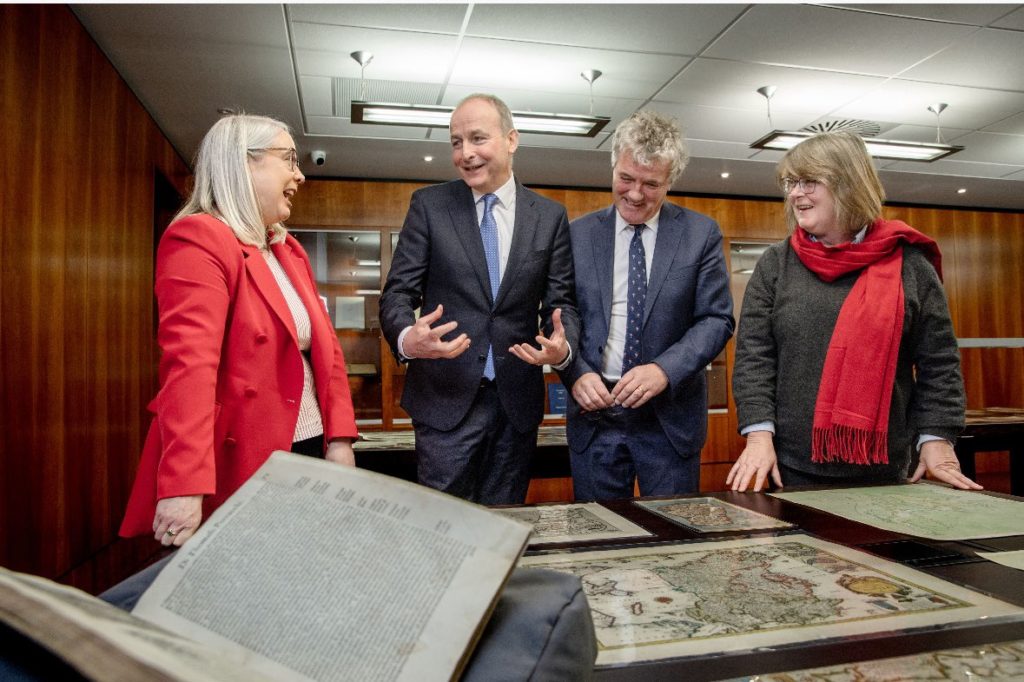THE Irish Government has purchased a vast and unique collection of maps and prints of Ireland which will be made publicly available at the University College Cork (UCC) library.
The Bonar Law Collection, acquired by the National Library of Ireland (NLI), is deemed the most complete visual record of Ireland, in map and print form, ever assembled by an expert private collector.
Born in 1933, Andrew Bonar Law is Ireland’s premier collector of printed maps and topographical prints.
After studying at Trinity College Dublin, he opened the Neptune Gallery in Dublin in 1965 and operated a successful business as a dealer in art, as well as in prints and maps.
His publications include The Printed Maps of Ireland to 1612 (1983); The Printed Maps of Ireland 1612-1850 (1997), and The Prints and Maps of Dublin (2005).
In total, the Bonar Law Collection features 10,000 maps and 9,000 prints, which include caricature prints and ballad sheets.
 Tánaiste Micheál Martin views part of the Bonar Law Collection (Pics: DFA)
Tánaiste Micheál Martin views part of the Bonar Law Collection (Pics: DFA)Announcing the acquisition, Tánaiste Micheál Martin said: “This remarkable and vast array of maps, sea charts and prints of Ireland represents the best collection of its kind anywhere in the world.
“It is unrivalled in the holdings of any public institution, including the British Library and the Library of Congress."
He added: “I am delighted that we have been able to preserve this valuable asset.
“It offers a fascinating insight not only into Irish geographical history, but also into the changing political landscape of the last two hundred years, for the benefit of the State and for the people of Ireland.”
Following the acquisition, the NLI has agreed a loan-arrangement with UCC to allows the collection to be placed in the university’s library where it will be open to researchers and the general public.
Ireland’s Minister for Arts and Culture, Catherine Martin, whose department funded the acquisition, said the purchase is “for the public good”.
“The collection represents a life’s work of study and expert knowledge of maps, especially maps of or relating to Ireland, and topographical prints,” she said.
“It is a testament to Andrew Bonar Law and his family, that such a unique historical record exists, and that it can now be preserved for the public good and will remain in Ireland," she added.
"I’m glad that my Department was able to fund this acquisition which will hopefully be available to view in its physical format following conservation assessment after 2025, with digital content available to view as early as this year.
“I wish UCC and the NLI teams the very best with this exciting work.”
Dr. Audrey Whitty, Director of the National Library of Ireland, said: "The excellent condition of the material in the Bonar Law Collection means that it will be an essential part of the NLI collection of printed maps and topographical prints, and a foundation collection for future digitisation projects, programmes and exhibitions.”
UCC have confirmed that the collection will be housed in their Boole Library, where it can be accessed by researchers and members of the public who contact the UCC Library Special Collections and Archives team.
The digital content within the collection is expected to be available for exhibition in early 2024 with the physical material available "following conservation assessment" after 2025, according to the Department of Tourism, Culture, Arts, Gaeltacht, Sport and Media.
“Through digital technology and innovative cartographic techniques, UCC research staff will activate the potential of the Bonar Law Collection to better understand how Ireland has changed, not just physically but socially, politically and ideologically through the ages,” UCC President Professor John O’Halloran said.
“Through our award-winning Cork University Press Atlas Series and related documentaries, UCC has a strong track record in ensuring public engagement with Irish history and culture," he added.


